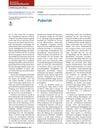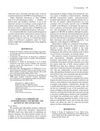Search
for
Sort by
Research
540-570 / 1000+ resultsresearch Faculty Opinions Recommendation of Safety of Low-Dose Oral Minoxidil for Hair Loss: A Multicenter Study of 1404 Patients
research Faculty Opinions Recommendation of Androgenetic Alopecia Present in the Majority of Hospitalized COVID-19 Patients – The 'Gabrin Sign'

research Faculty Opinions Recommendation of Minoxidil Dose Response Study in Female Pattern Hair Loss Patients Determined to Be Non-Responders to 5% Topical Minoxidil
60% of women who didn't respond to 5% minoxidil for hair loss showed significant improvement with a 15% minoxidil solution.
research Faculty Opinions Recommendation of Randomized Placebo-Controlled, Double-Blind, Half-Head Study to Assess the Efficacy of Platelet-Rich Plasma on the Treatment of Androgenetic Alopecia

research Clinical Utility and Validity of Minoxidil Response Testing in Androgenetic Alopecia
A hair test can accurately predict if a person with hair loss will respond to minoxidil treatment.

research Faculty Opinions Recommendation of Low-Level Light Therapy for Androgenetic Alopecia: A 24-Week, Randomized, Double-Blind, Sham Device-Controlled Multicenter Trial
Low-level light therapy significantly increased hair density and thickness in people with hair loss, but they didn't notice a difference.

research Faculty Opinions Recommendation of Topical Valproic Acid Increases the Hair Count in Male Patients with Androgenetic Alopecia: A Randomized, Comparative, Clinical Feasibility Study Using Phototrichogram Analysis
Applying valproic acid on the scalp increased hair growth in men with hair loss.
research Faculty Opinions Recommendation of a Randomized, Active- and Placebo-Controlled Study of the Efficacy and Safety of Different Doses of Dutasteride Versus Placebo and Finasteride in the Treatment of Male Subjects with Androgenetic Alopecia

research Faculty Opinions Recommendation of Androgenetic Alopecia and Risk of Prostate Cancer: A Systematic Review and Meta-Analysis
Hair loss at the top of the head is linked to prostate cancer, but other types of hair loss are not.

research Comparative Evaluation of Sonographic Ovarian Morphology of Indian Women with Polycystic Ovary Syndrome Versus Normal Women
Indian women with PCOS may need different ultrasound criteria for diagnosis than current standards.

research Puberty
The document concludes that pediatricians play a vital role in supporting adolescents through puberty and should enhance their competence in this area.

research Improved Efficacy of Low-Dose Spironolactone and Metformin Combination Than Either Drug Alone in the Management of Women With Polycystic Ovary Syndrome: A Six-Month, Open-Label Randomized Study
Taking low-dose spironolactone and metformin together works better for PCOS symptoms than either drug alone.

research Diffuse Hair Loss in Women
The document concluded that cyproterone acetate and minoxidil are effective for female hair loss, and a supportive doctor-patient relationship is important.

research Immune Response Involving the Bulge Region in Addition to Telogen Conversion Contributes to Hair Loss in a Case of Atypical Drug-Induced Hypersensitivity Syndrome
Hair loss in a drug reaction case involved both a common shedding phase and an immune attack on hair follicle stem cells.

research Optimization and Characterization of a Focal Dermal Hypoplasia Mouse Model to Test Potential Treatments
Li2CO3 improved skin disease in a mouse model of Focal Dermal Hypoplasia without toxicity.

research Comparison of Alopecia Areata Induction in C3H/HeH Mice by Injection of Lymphocytes from Mice with Induced vs. Spontaneous Disease
Both induced and spontaneous AA lymphocytes can cause alopecia areata in mice.

research Skin Physiology in Microgravity: A 3-Month Stay Aboard ISS Induces Dermal Atrophy and Affects Cutaneous Muscle and Hair Follicles Cycling in Mice
A 3-month stay in space causes skin thinning, disrupts hair growth, and changes muscle-related genes in mice.

research TCL1 Transgenic Mouse Model as a Tool for the Study of Therapeutic Targets and Microenvironment in Human B-Cell Chronic Lymphocytic Leukemia
The TCL1 transgenic mouse model is useful for understanding human B-cell leukemia and testing new treatments.

research The Inconsistent Regulation of HOXC13 on Different Keratins and the Regulation Mechanism on HOXC13 in Cashmere Goat (Capra Hircus)
The HOXC13 gene affects different hair proteins in cashmere goats in varied ways and is controlled by a feedback loop and other factors.

research Cetuximab-Induced Hypertrichosis of the Scalp and Eyelashes
A cancer drug caused unusual hair growth on a 100-year-old man's scalp and eyelashes.

research Non-Invasive Human Skin Transcriptome Analysis Using mRNA in Skin Surface Lipids
A new non-invasive method can analyze skin mRNA to understand skin diseases better.

research Systemic Autoimmune Diseases: Insights and Advances
The document concludes that systemic autoimmune diseases are complex, incurable, and require ongoing treatment and research.

research Insights into Male Androgenetic Alopecia: Differential Gene Expression Profiling of Plucked Hair Follicles and Integration with Genetic Data
Gene differences found in hair follicles linked to male baldness.

research Standard DNA Methylation Analysis in Mouse Epidermis: Bisulfite Sequencing, Methylation-Specific PCR, and 5-Methyl-Cytosine Immunological Detection
These methods help understand DNA changes in mouse skin.

research Mesotherapy with Dutasteride and Minoxidil in the Treatment of Androgenetic Alopecia
Dutasteride and minoxidil mesotherapy effectively treats hair loss with minimal side effects.

research Melanotic Pigmentation in Excisional Scar of Melanoma Patient Who Received BRAF and MEK Inhibitors
Patients with melanoma who saw dermatologists and were from higher-income areas were more likely to have follow-up visits, which was linked to lower mortality.
research Polycystic Ovary Syndrome: Anogenital Distance as a Marker of Prenatal Androgenic Environment and Review and Comparison of Diagnostic Criteria
Longer anogenital distance may indicate a higher chance of having polycystic ovary syndrome, and measuring this distance along with hormone levels could improve diagnosis.

research Melanoma Follow-Up and Mortality: A Large-Scale Study of Medicare Patients
Regular follow-up visits, especially with dermatologists, can lower death rates for melanoma patients, with socioeconomic factors also affecting outcomes.

research Marie-Unna Hereditary Hypotrichosis: Case Report and Review of the Literature
Marie-Unna Hereditary Hypotrichosis is a rare genetic condition causing sparse hair growth, requiring specific recognition for proper care.